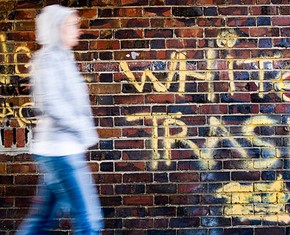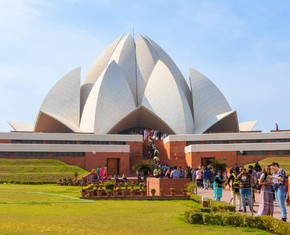The views expressed in our content reflect individual perspectives and do not represent the authoritative views of the Baha'i Faith.
A curious soul wanted to know, among other things, what makes the Baha’i Faith different from – and similar to – other religions? I was asked by my Baha’i Local Spiritual Assembly to answer him.
Baha’is believe that the spirit and source of Baha’u’llah’s revelation are the same as the other historic revealed religions; only the teacher and some of his teachings are new.
The Baha’i Faith shares the same eternal, essential principles that lie at the heart of all revealed religion, the two foremost teachings being to love God and to love our fellow human beings.
RELATED: 4 Ways to Understand the Relationship of the Prophets
Baha’u’llah stated explicitly that the best way to show love for God is to show love for others. So, as with all the spiritual teachers who came before, Baha’u’llah restated and expanded on that holy principle. Take the Golden Rule, for example – it appears in some form in every revealed religion and in many of the offshoots thereof. Baha’u’llah stated it this way:
O son of man! If thine eyes be turned towards mercy, forsake the things that profit thee, and cleave unto that which will profit mankind. And if thine eyes be turned towards justice, choose thou for thy neighbor that which thou choosest for thyself.
What’s different, besides the name of the teacher or spokesperson, is that the teachings of the Faith reflect the time of its appearance. We live in a far different world than even the one to which Muhammad came. We have instantaneous worldwide communication, an explosion of technologies that make it vastly more easy to do great harm or great good to larger groups of people. We have the capacity in this age, as in no other, to destroy our world or unite it.
The teachings of the Baha’i Faith, therefore, are given by the Creator for this time in the evolution of our species, which according to the Baha’i scripture, marks the ”coming of age” of humankind as we grow from adolescence to adulthood. Hence, Baha’i teachings regarding the independent investigation of truth and universal education go hand in hand with Baha’u’llah’s abolishing of the clergy. He tells us that we must now take responsibility for our own spiritual growth and welfare, and can no longer place it in the hands of a priesthood.
Instead, Baha’u’llah designed a democratically-elected administrative order whose guidance is given by elected bodies at the local, national, and global levels. In each Baha’i locality in which there are nine or more believers, we elect each year a Local Spiritual Assembly out of all adult believers in the locality. These are not clergy or ecclesiastics. They’re just Baha’is whom their fellow Baha’is feel combine a spirit of devotion with well-trained minds and mature experience. Baha’is all over the world elect their Local Spiritual Assemblies on April 21, which marks the anniversary of the day Baha’u’llah openly declared his revelation in Baghdad in 1863.
Baha’is in each country also elect a National Spiritual Assembly on a yearly basis from among all Baha’is in that nation. In the United States, this is done through a system of locally-elected delegates who travel to Wilmette, Illinois to vote for the nine members of the national body and consult on issues facing the national and global communities.
Every five years, the worldwide Baha’i community elects the Universal House of Justice, the members of which then reside in Haifa, Israel and live and meet at the Baha’i World Center on Mount Carmel. In this case, the electors are the members of the National Spiritual Assemblies of the world, who travel to Haifa for the elections.
The chief duties of these elected bodies is to teach the Faith and protect it, and to safeguard the communities in which they exist.
Now, here are some things that I, while I was investigating the Baha’i Faith as a teenager, found unique and revolutionary:
- There is no political aspect to Baha’i elections — no nominating, electioneering, or campaigning, and no constituencies to vie for. Someone who campaigned to sit on a Local Assembly would disqualify themselves simply by showing behavior that demonstrated their lack of understanding of the spiritual role of the Assembly and the ideal qualifications of its members.
- Each Baha’i administrative body has authority granted to it by Baha’u’llah himself in his written word. They were not an afterthought created by the Baha’is for the purpose of organizing their communities.
- Baha’u’llah gave these bodies authority only as institutions. The individual members have no authority, no honorific titles, and no privileges beyond or above those of any other Baha’i. So, though I am an officer of the Spiritual Assembly of the Baha’is of my city, my opinion is just my opinion. I have no individual authority at all.
The “leaders” of the Baha’i community are to think of themselves as the servants of the servants of God. In other words, for Baha’is the generally-accepted concept of leadership is turned on its head.
The Baha’i administrative order rests on another unique facet of the Faith. While previous prophets and teachers indicated verbally or implicitly which of their followers were to lead the community of believers upon their passing, Baha’u’llah established a written covenant with his followers. It clearly stipulated that his son Abdu’l-Baha — the authorized interpreter of Baha’u’llah’s teachings and the exemplar of what it means to be a Baha’i — was the center of his Covenant and the one person to whom all Baha’is should turn for guidance.
RELATED: Why We Call the Prophets by Different Names
Abdu’l-Baha, in turn, appointed his grandson Shoghi Effendi as the Guardian of the Faith, and tasked him with preparing the Baha’is for the election of the first Universal House of Justice. This took place for the first time in 1963. Of these spiritual institutions, Baha’u’llah wrote in his Most Holy Book:
The Lord hath ordained that in every city a House of Justice be established wherein shall gather counsellors … It behooveth them to be the trusted ones of the Merciful among men and to regard themselves as the guardians appointed of God for all that dwell on earth. It is incumbent upon them to take counsel together and to have regard for the interests of the servants of God, for His sake, even as they regard their own interests, and to choose that which is meet and seemly. Thus hath the Lord your God commanded you.
The Baha’i administrative order, then, is the present day expression of Baha’u’llah’s Covenant. It has, for the past 180 years, successfully protected the Baha’i Faith from schism. There are no Baha’i denominations or competing sects. This does not mean people haven’t tried to divide the Faith, but they have failed for the same reason that campaigning or lobbying for a seat on an elected Baha’i institution would fail. The expression of ego necessary to such an effort is contradictory to the spirit of the Faith.
















Comments
Sign in or create an account
Continue with Googleor